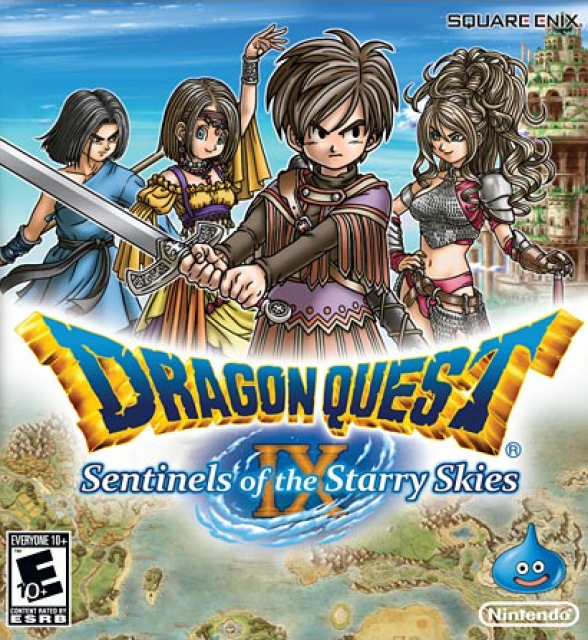A great RPG... for 1995
With the exception of a few titles in recent years, the Dragon Quest series has never been one to click particularly well with western audiences. Dragon Quest, along with Monster Hunter, Final Fantasy and Pokémon represent the cornerstones of the Japanese RPG industry, with each franchise selling gangbusters every time there’s a new release. Perhaps that’s why the Japanese have a penchant for releasing game after game after game with little to no improvement over its predecessor, or perhaps they’re afraid that change may bring about lower sales. Either way, when they delivered Dragon Quest IX: Sentinels of the Starry Skies to the thronging hordes of JRPG fans, you could be forgiven for believing you were playing a 15-year old game.
At its very core, Dragon Quest IX is a strong Japanese-RPG with all the traditional trappings. You play as a Celestrian, an angelic overseer charged with the protection of a small town. In traditional fashion, something goes horribly awry almost immediately, and your character is charged to recover the seven golden Fyggs needed to restore your Celestrian status. While the story may be relatively trite, it, like most JRPGs, simply serves as a catalyst for gameplay – as if the game was created before the story was woven around it.

Old-school battles on the bottom, Slime-based goodness on the top.
The quest to recover the Fyggs is as traditional as any JRPG can be. Moving between the various towns of the world, the player always miraculously turns up just in the nick of time to solve some huge crisis brought upon by the magical fruit. Towns are littered with NPCs giving side-quests, muttering on about pointless nothings and houses to loot unceremoniously. Battles, which are thankfully not random, follow the traditional turn-by-turn, menu-based format as seen in every Final Fantasy game since the dawn of creation. Really, what else is there to say – it’s as traditional as a JRPG can get.
One particular innovation that caught my eye, however, was how your entire party is completely customizable. Adding members to your party is like designing your main character all over again – you control what they look like, what skills they learn and their class right off the bat. Furthermore, any new item or piece of armor has a cosmetic effect on the party member. While this is a fairly simple addition that most western RPGs have implemented for the best part of the last decade, customisation is traditionally shied away from in eastern-developed RPGs. You end up with a band of misfits looking completely unlike any other player’s party, which is a neat concept.

Deep customization is this games greatest strength.
Unfortunately, that’s about where the praise ends. DQ9 is simply too old-fashioned for its own good, and severely hampered my enjoyment of it. Don’t get me wrong, I have incredibly fond memories of the mid-90s glory days of RPGs, but the games I played then are enjoyable today though the value of nostalgia. I can look past the glaringly obvious flaws in Earthbound and Breath of Fire because of how much I loved the games as a child. Releasing a game in 2010 that still makes some of the mistakes they have corrected in the past 15-odd years, then, is a poor decision. Glaring flaws impede gameplay at almost every junction, making completion a chore rather than an enjoyable task.
Storyline progression is made incredibly difficult in almost every way possible. After a storyline-critical piece of dialogue, no indication of where to go next or whom to talk to is given. Furthermore, the supposed journal chronicling your recent progression is a joke, barely updating and hardly relevant. The game does a terrible job of instructing you where to go and what to do – I had been beating my head against a boss for over an hour before I read online that you were supposed to go recruit a party. If a game leaves you so far in the dark that you must consult a FAQ consistently to find where you are headed, there is something hideously wrong.

Why half the characters are polygonal and half are sprites is beyond me.
The entire games feels unnecessarily archaic – trekking through the menu systems, completing quests, conversations and battling enemies is overwhelmingly obtuse and difficult to navigate. It feels as if no effort went into streamlining the experience for the user in any way, shape or form – the developmental team were happy to rest on their traditionalist laurels and leave it as is.
Perhaps this is simply symptomatic of my changing tastes, but I do not see a reason for this style of games existence in 2010. There is no reason for the game to leave you constantly in the dark as to what to do next, or to force you to grind levels to be strong enough to take on a simple battle, or to have the various NPCs of the world talk at you as if you were six. RPGs have moved on from this frustrating style of gameplay as a whole – even JRPGs, with titles such as Tales of Vesperia and The World Ends With You showing that a traditional JRPG is still achievable without concessions to enjoyment. Perhaps I’m simply spoilt by choice or my tastes have evolved from enjoying JRPGs, but this simply feels reluctant to change, or overly reliant on nostalgia. Nostalgia is a great thing to look back at, just don’t stare too long.

0 Comments